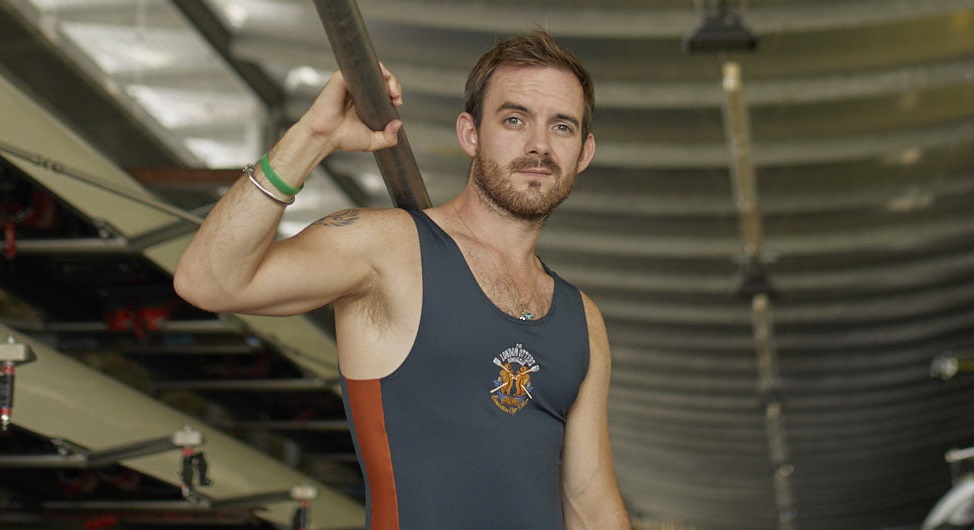‘Toxic macho culture put me off team sports – joining an LGBTQ rowing team changed my life’
Having stayed clear of team sports at school and university, Nick Coveney joined LGBTQ rowing club London Otters and now life is just a dream.
By Will Stroude

This article first appeared in Attitude issue 303, December 2018
As told to: Thomas Stichbury
I joined the London Otters — a rowing club, just to be clear! — just over a year ago as part of their “otterpups” learn-to-row programme. I’d always wanted to try my hand at it but the macho culture at university put me off.
That feeling goes back to being at school where, like a lot of my friends, I had a bad time of it during PE lessons. Particularly after being outed in Year 10 which led to hostile behaviour from the PE teacher himself — thanks Section 28.
While I’ve always been in relatively good shape, I yo-yoed in weight until about eight years ago when I decided to tone up, following the end of a relationship.
I used to only feel confident exercising alone, such as distance running or swimming, but I am so happy to have discovered the benefits of being a part of a team sport.

Photography: Francisco Gomez de Villaboa
Picking up my oar and joining the Otters has been fantastic. It’s an extremely friendly club with lots of different people (we have 140+ members) coming together to bond over something they love. Physically, being in a boat rowing with a crew in unison is an incredible feeling.
On top of weekly slots on the water, we’re given tasks to do on the “ergs” (the gym-style rowing machines). Training intensified while we were preparing for the 10th running of the Gay Games, an LGBT+ event held every four years, featuring more than 10,000 athletes, promoting equality in and through sport, which was held in Paris in August.
Fundraising included taking part in an ergathon, a relay race in teams covering the equivalent distance from East London’s Royal Docks to the Champs Élysées — 344km (214 miles). Despite being on a cruise ship at the time, with my boyfriend to celebrate his birthday, I managed to get involved. That’s dedication!

Photography: Francisco Gomez de Villaboa
The hard work paid off and in our first competition outside the UK, we collected eight medals — three gold, two silver and three bronze, incl?ding mine in the mixed eight masters. However, there was a slightly bitter taste to the triumph. During my last race, we veered slightly out of lane, my oar hit a buoy hard, it flew back and struck me on the chest, resulting in bruised ribs.
Alongside competing, we are keen to build the club, particularly the ladies and mixed squads. Sadly, we’re a bit constrained by the costs of boats and equipment, so we’ve been holding fund-raisers such as Bitchy Bingo nights, supported by Ku Bar.
In terms of how my body has changed since taking up rowing, I can tell that my chest and back muscles have developed quite a bit. I’ve always had relatively big legs from marathon running, but my core and upper body strength have improved significantly — much more than I ever managed by going to the gym.

Photography: Francisco Gomez de Villaboa
I also find that having a log of progress pictures helps me keep tabs on small changes in my physique which aren’t obvious without the comparison.
But the club isn’t all about honing and toning, there’s the social side too. You end up forming tight-knit bonds because you spend so much time together. Some teammates are now my closest friends. We’re more like a family — or, indeed, a romp of otters — than a club.
I’m also keen to dispel the myth that gay men don’t enjoy playing sport. This is something I’ve tried to challenge myself about. The feeling that sports were automatically ruled out for me because of my sexuality was to do with the hostility that I faced from insecure people at school and uni.

Photography: Francisco Gomez de Villaboa
Inclusive clubs such as the Otters emphasise that sports can be for everyone and, for some, that makes it much less intimidating to get involved and try something new. If I was to advise anyone looking to test the waters of competitive sport, but who hasn’t necessarily played before, I’d say: if you’re curious, why not try it?
The organisation Out for Sport has a great list of inclusive clubs covering an array of activities. If you don’t give it a go, you’ll never know!
